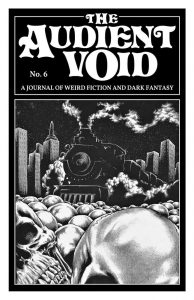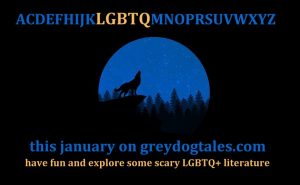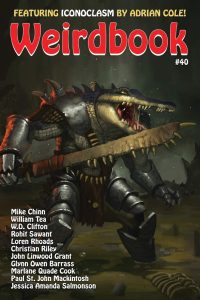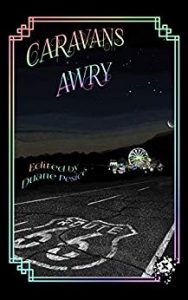Hello again, dear listener. Yes, we’re back on dark fiction by LGBTQ+ creators – in which we interview both experienced and more recently emerged writers, in conjunction with Jim LcLeod‘s Ginger Nuts of Horror site. This, as you will know, replaces our previous theme ‘The Root Vegetable in British Naval History’, which was sadly cancelled due to legal advice. Today we welcome Maxwell Ian Gold, a young American writer who has called 2018 his ‘breakout’ year, in which he has had a number of pieces published, including prose poems in The Audient Void and Hinnom Magazine, and his first short story, in the anthology Caravans Awry, edited by Duane Pesice.
So with those under his belt, we asked him for his thoughts on LGBTQ+ issues and writing…
MAXWELL IAN GOLD
 greydog: Hi, and welcome to greydogtales, Maxwell. Before we ask specific questions, maybe first you could tell the readers a bit about yourself, to set the scene. How do you describe the bulk of your own work – horror, weird fiction, magical realism, speculative, or what?
greydog: Hi, and welcome to greydogtales, Maxwell. Before we ask specific questions, maybe first you could tell the readers a bit about yourself, to set the scene. How do you describe the bulk of your own work – horror, weird fiction, magical realism, speculative, or what?
Maxwell: My portfolio of work is still rather small, yet; I would classify it under the weird literature category if I had to put a brand or label onto it. The idea of having to place one’s work under presupposed categories seems arbitrarily vague and at times, superficial, however I’m aware of the human need for categorization as it provides a kind of justifiable gratitude. As for myself, weird fiction and supernatural horror highlights my use of elements such as fantasy, science fiction, and horror that I attempt to blend together to create darker sensations.
I’d also go so far to say that I believe my work has a philosophical wish, to fulfil a larger purpose with the entities and the mythos that I have created. Many of the newer gods (Cyber Gods as I’ve so lovingly dubbed) are meant to be a strange juxtaposition on the current state of human affairs from the progress of technology, climate change, and many of the veritable human self-created error that have become so seemingly vast, their juxtaposition to the Old Ones makes those Lovecraftian gods seem almost a sweet release compared to the new pantheon. For the sake of clarification, my intentions, as this is a kind of on-going philosophical experiment, is not to replace anything that exists in the primal sources, but merely add-on and expand.
greydog: Interesting idea. And what’s your preferred format and length as a writer – flash fiction, short story, novella, novel, or even book series?
Maxwell: At this early stage in my writing career, my preferred formats are mostly prose fiction / poetry depending on the editor or publication as well as short stories. I hope to eventually delve into novels and collections, once the stars align.
greydog: Were there key books and films that influenced and helped you develop as a creator? Did they include LGBTQ+ works and/or characters – and if not, did this bug you?
Maxwell: Some key books and tales that I really treasure for their intrinsic style and timelessness, included J.R.R. Tolkein’s Silmarillion, Edgar Allen Poe’s The Masque of the Red Death, Robert Louis Stevenson’s Treasure Island, Clark Ashton Smith’s Memnon’s of the Night, H.P. Lovecraft’s Dagon and Cool Air, J.M. Barrie’s Peter Pan, and, Kurt Vonnegut’s Armageddon in Retrospect to name a few as there’s an entire library of tales I could rattle off.
Growing up, I did not necessarily have many LGBTQ+ books or films to look back on and I would say this did not really feel like a gaping void that I yearned to have filled, because I didn’t know any differently. This is not something to pity or that I would say is unfortunate, as there were many people in my family and close-family friends who were out, so it was just ‘normal’ for us. My drive to become a story teller came from mother’s father who would vividly describe his service in World War II in such detail to us, it was as if we were riding in the jeep with him while he was wearing that oversized coat in the cold Dayton winter. I did not discover many of the treasured LGBTQ+ plus stories and movies until after my college years.
greydog: When it comes to LGBTQ+ characters in your work, do you tend to depict particular identities – lesbians, gay men, bisexuals, transsexuals – any primary group that comes up in your writing more often than others?
Maxwell: I’ve only written one story where I barely skirted the issue of the sexuality of the character and it was merely to enhance the sensation of terror towards the final act of the story, when the main character realizes his boyfriend wasn’t really who he said he was, but a destructive cosmic plague – or one of the Cyber Gods to be precise.
greydog: Which piece of your own work are you most proud of, and why?
Maxwell: The first prose piece I had published, Ad’Naigon. It was the beginning of the Cyber Gods and the subsequent experiment that birthed the dark pantheon of its subordinate gods. If it was not for this piece, I would not have delved deeper into this philosophical and literary conundrum.
LGBTQ+ AND THE FIELD
greydog: Are many readers basically scared of queer fiction (which would be ironic in the horror field especially)? Or do you thing that they just don’t come across enough good examples to get into it?
Maxwell: Since I’ve not really been in the field that long, I can’t speak to experience, but I would make an educated guess there’s a certain level of assumption when people read the category “queer fiction” and some automatically transact a sexual connotation. I’d say there’s an equal share of readers who have simply not come across good examples and have their own preconceived notions.
greydog: ‘Straight’ is a silly term in many ways, but we’ll use it for shorthand. A number of straight creators utilise LGBTQ+ characters in their work. Do you see any inherent problems with this, or is it a good way of getting audiences to broaden their minds and reading scope. Are there any common misconceptions which get transmitted by straight creators?
Maxwell: It’s not an issue about straight or not as much as it’s an issue about making the sexual identity of the character relevant to the story. I see no inherent issue in creators wishing to educate, however, making a character gay without a purpose for the story as a whole, does nothing but taints that author’s creative ability. It’s not really homophobic, it’s just a bad decision.
For example, if a straight author writes science fiction novel with a heroine who identifies as non-binary, is alright if they can make that character’s sexual identity relevant to the story. If it’s not relevant to the story, then whether the author is straight or LGBTQ+, it would be bothersome for me, personally speaking.
greydog: Do you think LGBTQ+ fiction is more acceptable to the broad public when it comes from ‘nice middle- class white people’ than when it comes from additionally marginalised groups such as queer black writers?
Maxwell: I don’t think it makes a difference. Honestly, I think readers would rather see it from the community, which is one of the reasons why there are many presses dedicated to LGBTQ+ Fiction. As a gay Jewish man, I am happy to see work from those in the community. And while I have not read much LGBTQ+ fiction, I’ve not read any written by the atypical “nice white-middle class” person. There’s a different voice and experience that is necessary to give those characters life.
greydog: Do you have a favourite line or passage from your own work, or from that of another LGBTQ+ creator, that you’d like to share?
Maxwell: A line from one of my prose poems, ‘Cyber Things’ published in issue # 6 of The Audient Void: A Journal for Weird Fiction and Dark Fantasy.
“In the cyber forges of silver cities, where the mad, the brilliant, and deluded congealed in thought, lived a world of handheld creatures, comprised of bytes where our reactions to the immortal, inane and utterly dark corruptible palpitations of human urges became nothing but zombified reactions.” (AV #6, pg 18).
greydog: What have you planned in the way of work for 2019?
Maxwell: Currently, I have three short stories I am planning to publish, and I am slated to be a panellist at this years’ NecronomiCon where I’ll speak about my musical based on the life and times of H P Lovecraft, titled “I am Providence: The Lovecraft Musical.”
greydog: Good to have you here, and good fortune for the future.
Maxwell Ian Gold social media links:
Website: The Wells of the Weird – www.thewellsofthweird.com
Instagram: @flaviusgauntius – Maxwell I. Gold Author
Amazon: https://www.amazon.com/Maxwell-I.-Gold/e/B07L2HQ378
DON’T FORGET, FOR A WHOLE RAFT OF LGBTQ+ ARTICLES AND INTERVIEWS ALL MONTH, HEAD OVER TO GINGER NUTS OF HORROR, AT:
https://www.gingernutsofhorror.com/index.html


